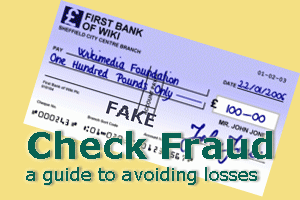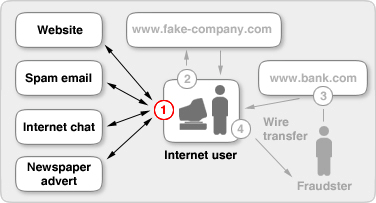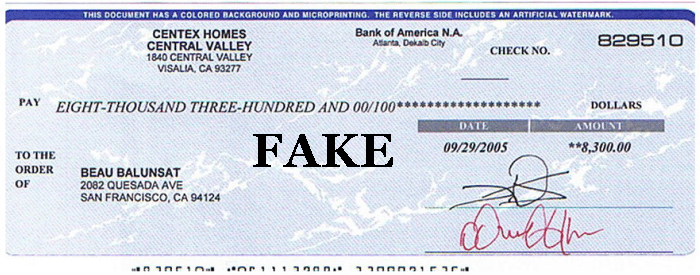
• Home •
Victim´s Story •
Fraud Prevention •
Project GSO •
Hall of Shame •
LINKS •

Work at Home Scams Part VI!
Money Mule Scams!
What is a money mule?
As most of the fraudsters behind these scams are located overseas and it is not possible to make cross-border transfers out of UK online bank accounts overseas, a "money mule" or "money transfer agent" is required to launder the funds obtained as a result of phishing and Trojan scams. After being recruited by the fraudsters, money mules receive funds into their accounts and they then withdraw the money and send it overseas using a wire transfer service, minus a certain commission payment.
Money mules are recruited by a variety of methods, including spam emails, adverts on genuine recruitment web sites, approaches to people with their CVs available online, instant messaging and adverts in newspapers.
Money Mule: How it works
Positions on offer sometimes include "UK representative", "shipping manager", "financial manager" or "sales manager". They offer you the chance to earn some easy money for a few hours work each week, usually just requiring that you have access to the Internet.
Although the prospect of making some easy money may appear attractive, any "commission" payments will be recovered as they are the proceeds of fraud and you may become embroiled in a police investigation. Remember that you will be the easiest part of the chain to track down and supplying any information to the fraudsters may also put you at risk from identity fraud.
If you see an opportunity to make some easy money and the offer seems too good to be true, then it probably is!
How can I avoid becoming involved in a money mule scam?
Be cautious about any unsolicited offers or opportunities offering you the chance to make some easy money. Be especially wary of offers from people or companies overseas as is harder for you to find out if they really are who they say they are. Take steps to verify any company which makes you a job offer and check their contact details (address, phone number, email address and web site) are correct and whether they are registered in the UK. Never give your bank details to anyone unless you know and trust them.
How to identify a money mule advert?
Money mule adverts or offers can take a variety of different forms and they may even copy a genuine company's web site and register a similar web address to add authenticity to the scam. These adverts will normally state that they are an overseas company seeking "UK representatives" or "agents" to act on their behalf for a period of time, sometimes to avoid high charges for making payments, or local taxes. The advert may be written in poor English with grammatical and spelling mistakes and they may urge you not to inform the bank or the police about the reason for making the payments. The adverts may seek people with accounts at certain banks, or Internet payment systems.
• Be wary of any unsolicited offers or opportunities for work, especially if the company is based overseas
• Verify the details of any company that you are consider dealing with and never give your bank account details to someone you don't know or trust
• Contact your bank immediately if you think that you may have become involved in a money mule scam
• If you see an opportunity to make some easy money and the offer seems too good to be true, then it probably is!
Even if you have nothing to do with the actual extraction of funds from another person's account, by allowing your account to be used to receive and transfer such funds, you may be acting illegally.
What to do if you suspect you have fallen for a money mule scam?
If you have received money into your account, transferred or attempted to transfer money elsewhere, immediately contact your bank or financial institution.
Your financial institution will start a fraud investigation and alert police if necessary.
The financial institution will take steps to ensure that criminals cannot transfer money out of your account. This may mean freezing or closing down your account to ensure the criminals cannot access the money.
If you have provided the criminals with your account details and Internet banking password, then unfortunately the criminal may be able to access your account. You should never give your Internet banking password to anyone - it must remain confidential!
Always make sure that you have personal firewalls, the latest anti-virus software updates and other security patches on your home personal computers, and change your banking password on a regular basis.
An effective fraud prevention program includes three major components:
- Education, Investigation, and Proactive Prevention.
Each of the components is strongly connected to the other two, and they all work together to provide the maximum protection against internal fraud.
An effective fraud prevention program can be implemented efficiently with the right people and the right expertise. It may be complex and time consuming, but the cost and pain to implement effective anti-fraud controls is small in comparison to potential and actual fraud losses.
© 2006-2010 by GSO • Contact

